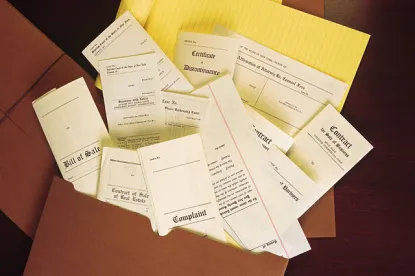Introduction
Justice delayed is Justice denied is a favorite aphorism. Most times, the aphorism criticizes the deliberative process of our judicial system. But, in fact, the aphorism is broader - the mere passage of time - regardless of its cause, results in a denial of justice for many reasons. Parties rely upon prior actions and reorder their future behavior, memories fade, witnesses become unavailable and evidence is lost.
In the recent case of Acts Ret.-Life Cmtys., Inc. v. Town of Columbus, 2016WL4087669(August 2, 2016), the North Carolina Court of Appeals grappled with a delay arising from a property owner filing a case in 2011 involving an alleged injustice first perpetrated by the Town of Columbus (“Town”) in 2002. As the Court of Appeals noted, finding justice in these situations involves discerning the distinction between on-going violations and continuing effects of an initial violation and this distinction is “subtle.”
Acts Ret-Life Cmtys., Inc. v. Town of Columbus
1. Facts
In 2002, the Town reclassified two water meters serving a retirement facility owned by Acts Retirement-Life Communities, Inc. (“Acts”) from commercial to residential. Thereafter, the Town sent monthly water and sewer bills to Acts calculated at the rates charged to residential customers.
In 2011, Acts filed a complaint alleging that the 2002 reclassification was arbitrary, capricious, unreasonable and unreasonably discriminatory in violation of statutory law. Acts asserted that the reclassification violated (1) the Town’s Charter, (2) the equal protection guarantee of the North Carolina Constitution, (3) the North Carolina Constitution as a discriminatory tax, and (4) equal protection and was a taking of property without due process. Additionally, Acts claimed that the extra money paid to the Town as a residential customer unjustly enriched the Town. Acts sought declaratory judgment relief and a permanent injunction requiring the Town to treat Acts’ facility as a single commercial user for water and sewer charges.
After conducting a bench trial, the Superior Court concluded that each monthly billing was an additional wrongful act taken by the Town and the statute of limitations did not bar Acts’ claims. The Superior Court found that the 2002 reclassification was unreasonably discriminatory, arbitrary, capricious and unreasonable. Specifically, the Superior Court found that the reclassification was in direct violation of the Town’s stated goal of fairness and state statutory law. Consequently, the Superior Court ruled that the reclassification was void ab initio. The Superior Court entered a judgment in favor of Acts in the amount $947,813.27, the total amount of overpayments. The Town appealed.
2. The North Carolina Court of Appeals
The North Carolina Court of Appeals reversed the Superior Court’s decision, holding that the statute of limitations barred Acts’ claims.
The Court of Appeals reasoned that the parties had not disputed that the applicable statute of limitations was 3 years and Acts had filed its claims more than 3 years from the date the Town reclassified Acts’ meters. Therefore, unless an exception applied, the statute of limitations barred Acts’ claims.
Acts contended that the exception of a continuing wrong or violation applied. Acts asserted that each time the Town transmitted a monthly invoice for water and sewer charges calculated at the rate charged residential customers, the Town had engaged in a separate wrong. Therefore, the statute of limitations began again each time the Town sent a monthly invoice. Because Acts filed its claims within 3 years of the last invoice transmitted by the Town, its claims were not barred.
To determine whether each monthly bill for water and sewer services was a continuing wrong or violation, the Court of Appeals considered “the policies of the statute of limitations and the nature of the wrongful conduct and the harm alleged. ” The “actual wrongdoing” alleged by Acts was the Town’s decision to reclassify Acts’ meters from commercial to residential in 2002.
The Court of Appeals, explained that there was not a continuing violation, occasioned by continual unlawful acts, but only continual ill effects from an original violation. Because continual ill effects from an original violation were insufficient to satisfy the continuing wrong or violation doctrine, Acts’ claims were time barred.
Comments
1. Justice delayed is Justice denied. The longer a wrong continues the harder it is to discern justice. In a postmodern world, parties adjust their behavior to economic changes rapidly. While Acts may not have passed its increased water and sewer charges to its residents, Acts continues to operate its facility for eight and one-half years. If Acts had prevailed and had passed these increased costs to its residents, is Acts intending to grant a refund to the residents or their estates?
Similarly, the Town orders its behavior assuming that the charges are lawful. If Acts had timely challenged the rate schedule, the Town could have established an entirely new schedule.
2. The core of Acts’ claims is that the Town violated a statute authorizing the Town to fix a schedule of utility rates. The statute authorizes the Town to vary rates according to classes of service. The Court of Appeals’ opinion concludes that the single unlawful act occurred when the Town reclassified Acts’ meters in 2002. The facts in the opinion are unclear whether the Town adopted a different schedule from time to time from 2002 to 2011, even if the schedule did not change the 2002 classification.
3. Acts is a good example of the subtlety and complexity of law. While justice involves a “middle ground” frequently, some legal questions require stark “yes/no” answers. In the area of statutes of limitations, the answer is stark because the purpose of statutes of limitations is certainty.
4. In a world of negative interest rates and slow growth, all entities and enterprises are seeking ways to minimize expenses. It seems likely that companies seeking refunds will increase.




 />i
/>i

